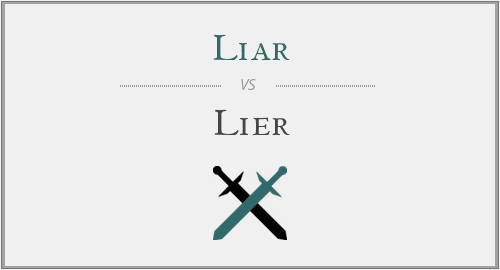Even though there is a slight spelling difference between “liar” and “lier”, their meanings are actually completely different. They might look similar and have the same origin, but “liar” and “lier” should never be confused in a message because they refer to completely different concepts.
Let’s explain what both words mean and how to use them properly so you will never get confused in front of them!
Liar vs. Lier
The confusion and similarity between “liar” and “lier” mainly owes to their same origin. More exactly, both words are formed from the verb “to lie”. Their different meanings, consequently, are owed to the multiple meanings that “to lie” refers to. More exactly, “to lie” can refer to not saying the truth, but it can also mean to stay in a horizontal, flat position on a certain surface.
So when it comes to “liar” and “lier”, the first one is the noun referring to the person who “lies”, with the meaning of not saying the truth, while “lier” is the noun for the other sense of the verb “to lie”. “Lier” is less commonly used and describes a person positioned horizontally on a flat surface.
When do we use “liar”?
“Liar” is a very common word in the English vocabulary anytime when you want to describe a person who is not saying the truth. “Liar” is defined as a noun referring to someone who is telling lies.
Example: Everyone in the village knew better than to trust that liar. – “liar” is used to describe a person who usually tells lies.
When do we use “lier”?
“Lier” should only be used for someone positioned horizontally, and this happens very rarely, as “lier” is not a very usual word in English. On the other hand, “lier” should never be used with the same meaning as “liar” and must never replace it, because it will definitely be considered a misspelling.
Example: Stop spending all your day in bed, people will start calling you a lazy lier! – “lier” is referring to a person sitting in a flat, horizontal position.
Conclusion
The explanation for “liar” and “lier” is simple and easy to remember. They both come from “to lie”, which explains their similarity, yet they have different meanings, just like “to lie” can refer to several actions. “Liar” is a common English word, referring to a person who tells lies, whereas “lier” is rarely used to describe a person who lies in a horizontal position.





Have a discussion about this article with the community:
Report Comment
We're doing our best to make sure our content is useful, accurate and safe.
If by any chance you spot an inappropriate comment while navigating through our website please use this form to let us know, and we'll take care of it shortly.
Attachment
You need to be logged in to favorite.
Log In